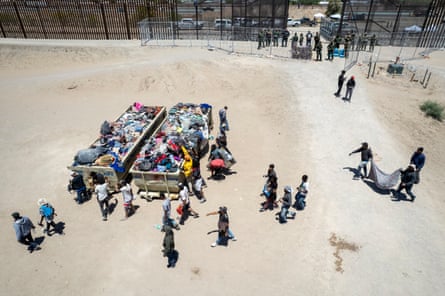“My plan is to give up,” Fernando Jesús Manzano, 32, from the state of Falcón, Venezuela, said dejectedly as he gazed at the hundreds of fellow migrants waiting to turn themselves in to US migration authorities as Thursday turned into Friday and a new policy era at the US-Mexico border.
Manzano arrived at “Door 42”, a gate along the border barrier in El Paso, west Texas, shortly before the expiration of Title 42, a Trump-era rule implemented during the coronavirus pandemic that allowed the US to turn away migrants at its border with Mexico without allowing them to exercise their right to seek asylum.
The man was too late. US Customs and Border Protection, as well as Texas national guard soldiers, had already set up concertina wire and were heavily patrolling the area where Ciudad Juárez, Mexico, meets its twin city across the border, El Paso, by the time he arrived.
The troops in camouflage, holding their rifles across their bodies in an intimidating stance, were not allowing him or any other migrants to approach the gate to request asylum.
The crowd of about 500 people at this one site was neatly organized into two groups: single men in one and families in the other. Separating them were 15 portable restrooms and two large dumpsters where all of their belongings had been discarded.
The US authorities expect migrants being processed at the border not to be encumbered by the small pieces of luggage many may have carried for months on dangerous overland trips from Central and South America, through Mexico to the border.
“This was my last try. I’ll have to find a job in Juárez to save for a ticket back home, and return defeated,” Manzano said.
Manzano, a professional barber, said that two months ago he fled Venezuela, which has been abandoned by more than 7 million of its citizens in the last eight years amid the political and economic crisis of Nicolás Maduro’s regime.
He came desperately seeking better opportunities for himself, his wife and two infant children, in contrast to growing poverty in Venezuela where money, he said, was never enough no matter how hard he worked.

Frustrated, he fought back tears as he recalled the two times he previously crossed the US border with Mexico in the last month without permission and was expelled back to Mexico by the authorities.
The last time, he found a lawyer in the US to help him and was on his way to New York, when agents at a migration checkpoint told him the forms he had filled out were not valid.
At the border more people arrived as the night progressed. On the bank of the Rio Grande 30 more people sat quietly, all hoping authorities would let them in last minute.
“No pueden entrar [you can’t come in],” a Texas national guard soldier shouted across as he adjusted a coil of the concertina razor wire marking the line between the waiting people and America. At first his action prompted some to believe they would be let in, but then they all listened and sat back down.
When the clock struck 10pm local time, midnight on the US east coast, the exact moment Title 42 expired, the atmosphere at the gate in the tall border barrier remained tensely silent.
Only sporadically, when small vans arrived at the gate from the US side to pick up migrants who had been allowed through and take them elsewhere for processing, would migrants clap and cheer for a few seconds.
But as the night progressed, the cold did too. Temperatures dropped enough for those waiting at the gate to want a second layer of clothing. The most readily available were the sweaters, jackets and blankets in the two dumpsters where migrants had discarded all of their belongings earlier in the evening.
Some grabbed the items but shook them repeatedly to get rid of the thick layer of dust and debris covering them before putting them on.
“They’re not letting us in, I don’t know why,” said Oscar Adrián Izaguirre Brito, 20, a mechanic from Caracas, Venezuela.
Izaguirre Brito arrived at the gate thinking the end of Title 42 meant he would be able to cross to the US that night but was met with disappointment when he arrived.
“I’m tired and I want to cry, I can’t keep talking,” Izaguirre Brito said.
After describing himself as desperate, he explained that he was the oldest of 10 siblings and that his parents rely on him for support.
He’s made multiple attempts at crossing the border, but this was the first time he had planned to turn himself in. The last time he was expelled for going across without permission, he said, was Wednesday night and then, when border patrol agents released him back into Mexico, three armed men robbed him and took his cellphone, he said. His parents still don’t know he’s in Mexico again, he added.
Because he has a permit to work in Juárez, Izaguirre Brito will go back to the car repair shop he had been working at before crossing the border last week, trying to save money to buy a new phone. With it, he would be able to try to get one of the very limited appointments for an asylum interview through the US’s CBP One app.
Joe Biden’s new hardline border policies, heavily criticized by immigration advocates and progressives, were starting to bite.
“If I am given the opportunity, I will take it and take full advantage of it,” Izaguirre Brito said.












